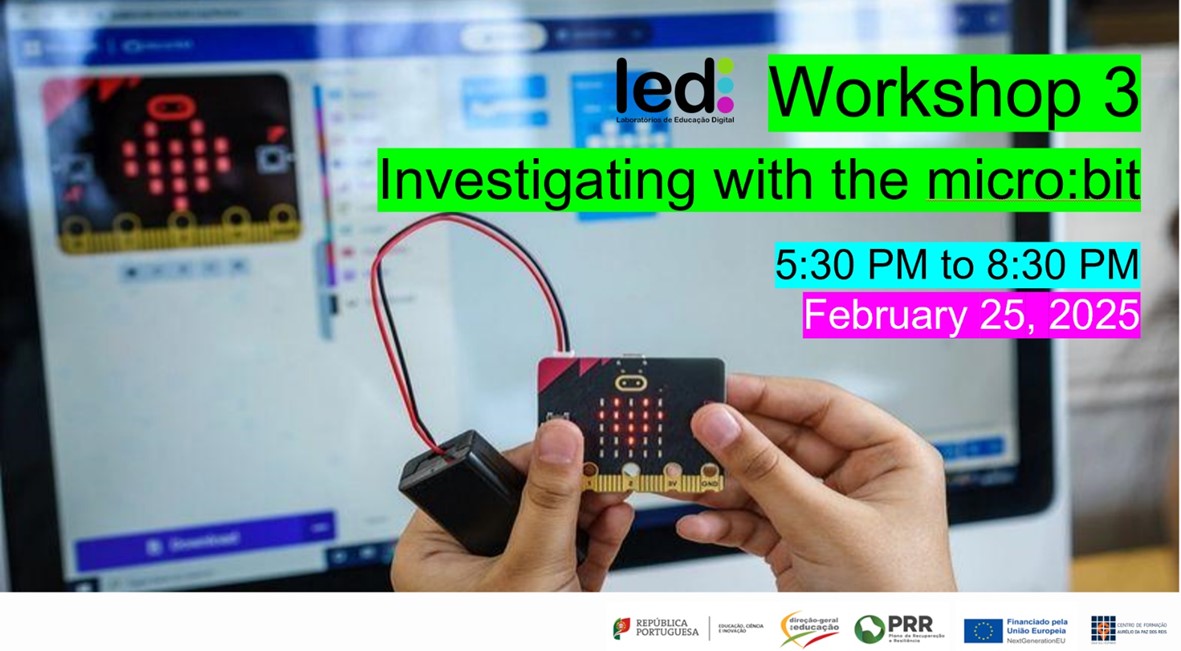
Workshop LED: "Investigating with the micro:bit" – Programming and Science in Action
This workshop was the third in a series of workshops organised by the Directorate-General for Education (DGE) of Portugal as part of its teacher training strategy within the Digital Education Labs (LED) initiative. These sessions aim to support teachers in implementing innovative methodologies and integrating technological resources into their teaching practice.
More than 1000 participants gathered to explore the potential of this programmable board in interdisciplinary learning scenarios.
Exploring the micro:bit in education
The workshop focused on hands-on learning, demonstrating how the micro:bit can be used to develop digital and scientific skills. Participants had the opportunity to learn how to programme the device, explore its sensors, and integrate concepts from Physics, Mathematics, Physical Education, and ICT to solve real-world challenges.
Showcasing innovative learning scenarios
The session featured LED learning scenarios, highlighting projects developed in Portuguese schools that demonstrate the pedagogical potential of the micro:bit in active learning:
- "MicroPassos: Count and Transmit" (School Cluster of Arrifana) – A project where students programmed the micro:bit to count steps and transmit the data via radio, fostering computational thinking and experimentation. They explored different programming functions and analysed data to improve interactivity and efficiency, reinforcing both programming skills and problem-solving.
- "TrAIner" (School Cluster of Abrigada) – An interactive game using artificial intelligence to assess sports techniques in Physical Education. Students programmed the micro:bit to recognise movements, assign scores based on accuracy, and provide feedback. The project combined motion modelling, machine learning, and programming, helping students understand sports biomechanics through technology.
- "AstroBit" (School Cluster of Lousã) – A project integrating physics, programming, and machine learning to simulate the impact of an egg on different surfaces. Instead of conducting destructive tests, students used the micro:bit to measure acceleration, velocity, and force, training an AI model to predict breakage. This activity allowed students to explore free fall, impact absorption, and material resistance, demonstrating how technology can enhance scientific exploration.
Ideas for the Classroom with the micro:bit
The innovative scenarios shared in this workshop highlight practical ways to integrate the micro:bit into different subjects, offering teachers inspiration and concrete strategies for designing engaging and hands-on learning activities. Whether applied in STEM, Physical Education, or interdisciplinary projects, these experiences reinforce how these technologies can stimulate creativity, experimentation, and the development of problem-solving skills among students.
Expanding Digital Education in Portugal
This event is part of DGE's ongoing effort to empower teachers, promoting the integration of digital technologies in education and encouraging new approaches to teaching and learning. This initiative follows the installation of 1,300 Digital Education Labs (LED) across 803 school clusters and standalone schools in mainland Portugal, equipped with resources in Programming and Robotics, Multimedia Studios, 3D Printing, and STEM.
For more information on LED workshops and training sessions, visit: led.dge.medu.pt.
Author: Ana Alves